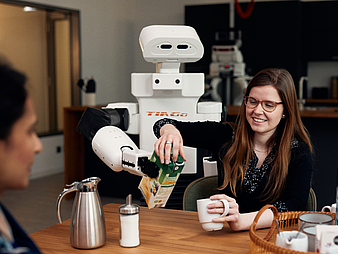University Of Bremen Contributes To New Center For Co-constructive Artificial Intelligence
The Universities of Bremen, Bielefeld and Paderborn are pooling research expertise to develop AI systems that can specifically support people with tasks
Future systems of artificial intelligence (AI) and in particular AI-based robots must be able to understand and assess not only their own actions, but also the actions of others. Scientists from the Universities of Bremen, Bielefeld and Paderborn will now permanently bundle their research at a cross-site center. In the ” Joint Research Center on Cooperative and Cognition-enabled AI” (CoAI JRC), the expertise of the three strong research partners will enable new ways in the interaction and learning ability between humans and machines. The Center for “Co-constructive AI”, which is unprecedented in Germany, is also intended to contribute to the training of the next generation of research and technology leaders who represent a new perspective on AI in science and society. For this purpose, the CoAI JRC is planning a joint curriculum to inspire and empower young researchers for the topic.
Top researchers from the fields of artificial intelligence, robotics, human-computer interaction, medical assistance, linguistics, psychology and philosophy work at the CoAI JRC to develop, among other things, the basis for robots with completely new skills. The AI systems developed here have the cognitive ability to understand how and why they do something. They recognize their own knowledge gaps independently. However, the AI systems also have an interactive ability in order to then acquire new skills in interaction with people. To this end, the scientists are researching a novel conceptual framework for intelligent action: the concept of so-called co-construction refers to cognitive and interactive mechanisms, with the help of which tasks can be mastered by man and machine together. This bundles the expertise on co-constructive AI from three scientific locations in one network.
An integral part of the research at the CoAI JRC is the so-called Virtual Research & Training Building (ViB) – a digital laboratory that will be accessible to the international scientific community in the spirit of open, transparent and participatory research. Robots, environments and software can be used here as if the researchers were actually in the laboratory. Research data and results are thus available to the general public, for university teaching and further research.
For the universities of Bremen, Bielefeld and Paderborn, the cross-location center means increased visibility for their respective and joint research and training activities on artificial intelligence. The university managements welcome and support this bundling of competences. This cooperation is a strategic and sustainable contribution to the profile development of the three cooperation partners. They thank the scientists involved for their commitment.
Prof. Dr. Michael Beetz, head of the Institute for Artificial Intelligence (IAI) at the University of Bremen, describes the special nature of the AI research carried out at the CoAI JRC: “The most flexible, powerful and reliable learning systems are neither ChatGPT nor any of the other machine learning systems that are currently causing so much excitement. Rather, it is us humans: through interaction with others, we learn from birth how the world around us works and how we can act successfully in it. Co-constructive AI takes these skills as inspiration to explore AI systems that can not only get things done, but help others as well. To do this, these co-constructive AI systems must understand what their human partners want and can do,Minds, Media, Machines “an excellent starting position to achieve the research goals set by the CoAI JRC in cooperation with the Universities of Bielefeld and Paderborn.
Prof. Dr. Philipp Cimiano, head of the Semantic Databases working group and coordinator of the Center for Cognitive Interaction Technology(CITEC) at Bielefeld University, sees enormous potential here: “With the new CoAI JRC center, we are creating an excellent and unique framework for new breakthroughs in AI research, which are only possible through interdisciplinary cooperation. CoAI will build on previous research at the Cognitive Interaction Technology Center (CITEC) and explore a new paradigm of AI. In contrast to current language models like ChatGPT, this paradigm will allow the systems to understand the consequences of their suggestions and give an idea of what it means to act together with a human. Without this ability, we cannot create long-term AI systems that work reliably with us and that we can trust.”
Prof. Dr. Katharina Rohlfing, head of the Psycholinguistics working group and the Language Game Laboratory at the University of Paderborn, explains: “Through the joint center we create synergies between the partner universities and can devote ourselves to the mechanisms underlying the co-construction. In this way, we achieve the best possible focus and networking of our existing and future research activities.” In Paderborn, the focus is on researching intelligent socio-technical systems and the role of co-construction in the context of explanatory processes. Scientists from the Universities of Paderborn and Bielefeld have also been investigating this concept since 2021 as part of the DFG Collaborative Research Center / Transregios 318 ” Constructing Explainability”, which is dedicated to the topic of “explainability of artificial intelligence (AI)” and whose spokeswoman is Rohlfing.

